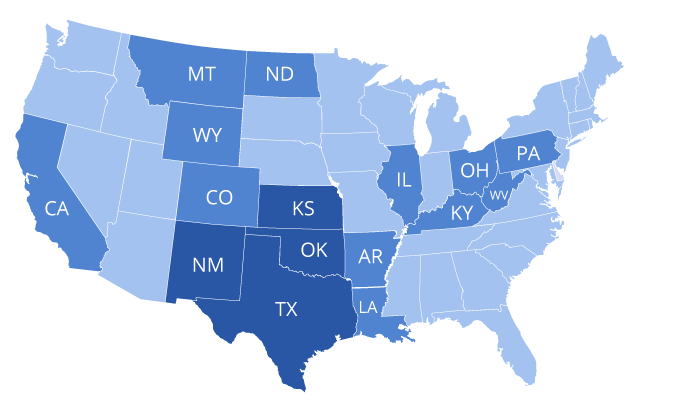Why Sell Your Mineral Rights?
Learn the top 6 Reasons Mineral Owners Sell Their Oil & Gas Royalties and Mineral Rights
Sell Your Mineral Rights (Request an Offer):
Why Do People Sell Their Mineral Rights?
People sell their mineral rights for a variety of reasons. Some need immediate cash, while others are seeking to improve the quality of their lives. Most want to sell while their minerals still have value and to avoid burdening their heirs with the learning curve and management duties. There are a lot of reasons to sell.
Have Another Investment in Mind
Sometimes people sell because they have another investment in mind (start a business, buy stocks while the market is low, buy real estate, etc.). Other times, life just happens, and people find themselves having to make tough financial decisions. Thankfully, mineral owners can sell their minerals for nearly immediate cash. There is a long history of selling mineral rights when hard times hit.
Improve Lifestyle
Sometimes having a lump sum of cash (imagine 10K – 100K) can drastically improve the quality of your life. This money could be used to buy a car, buy a house, or remodel your kitchen. You could also use the money to pay off student loans or other debt. Or, it can be used to put a child or grandchild through college and let them start educated and life debt free.
Declining Checks
Oil and gas are finite resources, and all wells eventually run dry. Decline curves are steep (especially in shale plays), leaving mineral owners with less and less royalty income each month. Some mineral owners prefer to sell while the well or wells are still producing reasonable quantities of oil and gas.
Don't Want to Support Fossil Fuels
As climate change becomes a more relevant and serious issue, many people feel guilty about receiving ongoing oil and gas royalties. A lot of people want to do their part to reduce their carbon footprint and lessen their contribution to climate change. That might be selling your minerals and buying solar panels.
Heirs Are Not Interested
Some people have no heirs, or more commonly, their heirs are not interested in owning mineral rights. Mineral owners who own a lot of minerals are also less likely to want to burden their heirs with the extensive time and energy required to properly manage the mineral rights.
Tired of Paying Taxes on Small Minerals
It can be burdensome and annoying to pay annual ad valorem (property) taxes and file state income taxes solely for the minimal royalties that you receive. This is especially true when you are not emotionally tied to the land your family once owned.

1. You Have Another Investment in Mind
There is a long history of people selling mineral rights when times are tough.
During the great depression, many landowners sold their minerals in order to keep their land. While most Americans are no longer farmers, a great number of jobs have been displaced in the last decade.
The rise of automation, frequent natural disasters, and the growing gap between the “haves” and the “have nots” have made it especially difficult for many Americans to make ends meet. This has never been more true than now. Rising inflation has increased the cost of living, and many families struggle to make ends meet.
Thankfully, mineral owners have the ability to sell their mineral rights for a lump sum, potentially saving themselves from financial ruin.
Some mineral buyers, such as Blue Mesa Minerals, can close a deal in as little as 10 days. Watch out for buyers who need 60 days to close a deal. Some complex title searches can take a while, but often, these companies are fishing for a bigger company in order to flip your minerals.
Another Warning:
Some mineral owners try to use their mineral rights as collateral for a loan, but sadly, many are taken advantage of by predatory lenders who exploit them (sometimes causing the loss of their mineral rights). Learn how to protect yourself from predatory mineral loans.
2. Improve Your Lifestyle
You can keep cashing small royalty checks each month or sell your mineral rights for a lump sum and use the money to improve your lifestyle. Imagine having enough money to:
- Buy a car and have reliable transportation to work.
- Buy the luxury car you’ve always wanted.
- Buy a new house or a vacation/retirement home.
- Travel and explore the world.
- Remodel your kitchen or bathroom (or both).
- Buy land.
- Start a business.
- Pay for a wedding.
- Downpayment on a house.
Selling your mineral rights is an easy and quick process. Contact us to get started.


3. Declining Revenue
Oil and gas are finite resources, and eventually, all wells run dry. Almost all wells exhibit a steep decline curve, producing a majority of the oil and gas during the first couple of years.
Most new mineral owners are surprised and disappointed to see their royalty payments decline by an average of 60% in the first year.
After their initial decline, vertical wells can produce low quantities for multiple decades, while horizontal fracked wells typically have shorter lives. As we get better at pulling hydrocarbons out of the ground in massive quantities, the decline curves get steeper, and the economic life of the well is shortened. The end result is a well that produces for a shorter period of time.
4. You Don’t Want to Support Fossil Fuels
As concern over climate change grows, people are becoming more aware of how their actions affect the planet.
More and more mineral owners, especially younger generations, feel uncomfortable receiving monthly royalty payments for one of the largest contributors to climate change.
To resolve this cognitive dissonance, some mineral owners choose to sell their mineral rights.
Some use the money to buy solar panels for their houses while others invest or spend the money in other ways.


5. No Heirs (Or Heirs Are Not Interested)
Sometimes mineral rights are sold for reasons related to heirs. Some mineral owners:
- Have no heirs.
- Heirs do not want to invest time and energy into learning to manage minerals properly.
- Heirs are not interested or do not want to benefit from fossil fuels financially.
- Don’t want heirs to fight over mineral ownership.
Know their heirs would prefer cash.
Not everyone is cut out to be a mineral manager. Properly managing mineral rights, especially a lot of mineral rights, can be a time-consuming hassle, requiring:
- Knowledge and experience (new mineral owners often refer to inheriting minerals as “drinking from a firehose”
- Organization skills
Monthly revenue check analysis
Oil and gas lease negotiation (often requiring an attorney) - State ad valorem (or property) tax payments
- State income tax filing
- Division order review and signing
- More complex federal income taxes
What about an LLC or Trust?
Putting minerals into an LLC or a trust can put a significant burden on the trustee. If none of the heirs are qualified to manage the trust, a large percentage of the royalty revenue may be spent on professional mineral management fees.
6. Tired of Paying Taxes on Small Royalties
Let’s face it. Most mineral owners own a very small interest and receive correspondingly small royalty checks. As the mineral interest gets passed to the next generation, the ownership is further fractioned.
Eventually, you end up with hundreds of mineral owners who each own a tiny fraction of interest. This interest becomes too small to make a significant difference in their finances. In fact, managing small minerals can be more of a hassle than it is worth.
Minerals that are too small are really hard to sell – the cost of transferring ownership may be more than the value of the minerals. It’s better to sell before you get to this point – and not to put your heirs in this position.
ANOTHER SITUATION
Some counties tax non-producing minerals, so you might be receiving an annual tax bill but no royalty payments. You may be better off selling your non-producing minerals to the surface owner or a mineral buyer.

Our Process is Quick and Easy
We buy oil and gas royalties and mineral rights in Texas, Kansas, Oklahoma, New Mexico and throughout the United States. If you have a clean title and relevant documents (royalty statements, division orders, lease, title documents), we can move this process along quickly. We can usually give you an offer in 48 hours. Unlike a lot of companies, we don’t flip minerals. We pay cash, and we keep what we buy, which allows us to offer a fair market price and close quickly.
Our 4-Step Process
We won’t pressure you to sell your mineral rights. We are here to give you information so you can make an informed decision.
1. Request an Offer
Request an offer. We we’ll be happy to evaluate your mineral rights and present you with an offer.
2. Submit Supporting Documents
Send us the last few months of royalty statements and any supporting documents (leases, deeds, division orders etc.).
3. Review and Accept Offer
We will review and appraise your mineral rights and provide you with a competitive offer.
4. Sign Deed and Receive Payment
Once we agree on a price, a closing date will be scheduled. You will sign and notarize the document. When we receive the paperwork, we will immediately wire the funds.
Nationally Focused
Where We Buy Mineral Rights
We buy both producing and non-producing minerals in all oil and gas states. However, we are especially interested in Texas and Kansas mineral rights.
|
We even buy minerals in more obscure states, which produce very little oil and gas compared to other states.

How We Value Mineral Rights
There are many factors that play into the value of mineral rights. These include location, producing vs. non-producing properties, current oil and gas prices, well production figures, lease terms, and even the operator of the well or wells. We also look at the risks of buying and owning minerals that you are interested in selling.
Location
Minerals in the hottest shale plays are more valuable than those in older fields with conventional wells.
Producing vs. Non-Producing
Producing minerals are often worth more than non-producing minerals because they are generating revenue.
Oil & Gas Prices
When oil and gas prices drop, revenue drops, and sometimes operators are unable to continue operating the well.
Production
Highly productive wells (and off-set wells) can increase the value of your minerals.
Lease Terms
Favorable lease terms (such as a 25% royalty reservation) positively impact the value of the leased minerals.
Operator
A small number of operators are unethical, and their reputation automatically devalues your minerals.
Why Sell?
Why People Sell Their Mineral Rights
I am putting my affairs in order. I don’t want to burden my kids with the hassle of transferring ownership and managing small mineral rights. When my sister passed away, my niece and nephew had to hire an attorney to help them with the minerals. I don’t want my kids to go through that.
I inherited my mineral rights so they were sentimental, but I don’t really want to bother with managing them and filing extra tax returns. I decided to sell and use the money as a down payment on my house.
I had no idea how fast the oil production would decline. My checks are only 20% of what they were a few years ago. I should have sold my mineral rights when the wells were brand new and still generating huge royalties.
My oil wells have been producing for decades and the reserves are almost depleted. Once the wells are plugged, the value will be significantly lower. I’d rather cash out now.
I inherited mineral rights, but don’t want to be involved with fracking and fossil fuels. I would prefer to support renewable energy and do my part to reverse climate change.
